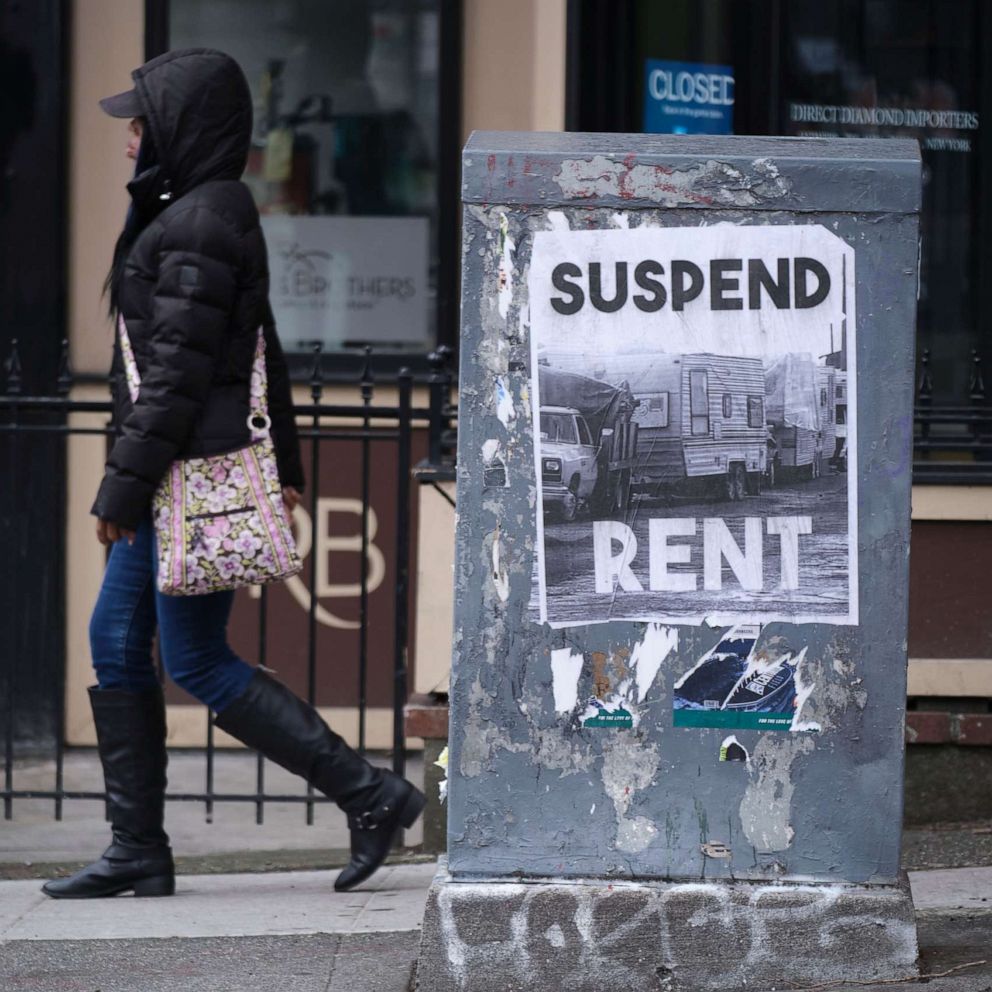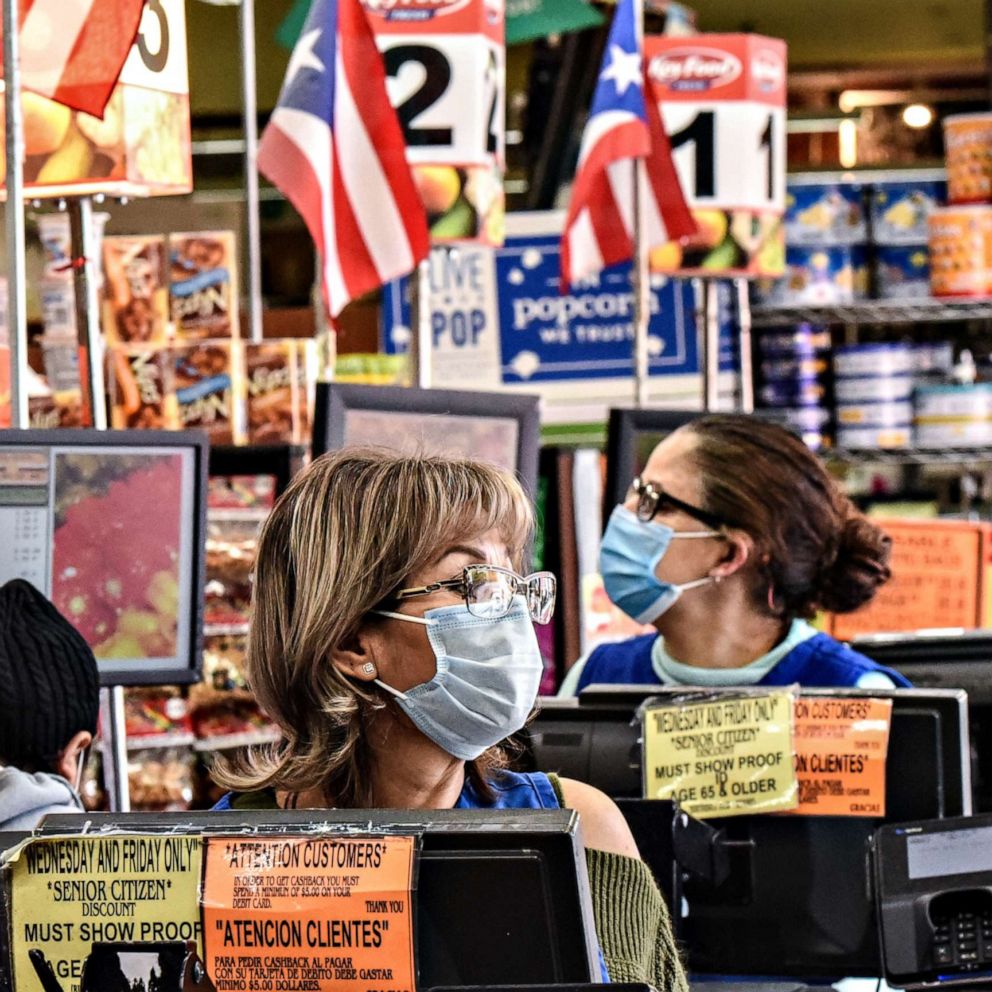Cash advance apps like Dave, Earnin see use surge amid COVID-19
The main attraction for using payday advance apps is quick cash.
Ashely Perkins is one of the millions who have been laid off or placed on work furlough as the novel coronavirus puts the global economy in a tailspin.
The 35-year-old child nutrition program manager from Napoleonville, Louisiana, said "thankfully," her furlough, which began April 13, has been with pay.
But she said her husband is also on furlough without pay and his salary is three times hers, affecting their household income "dramatically."
Perkins told ABC News she has been using Earnin -- an app that lets users tap into their paycheck before payday and receive a cash advance -- to help with finances. She's been using the service for the past two years and had previously taken advances out with it.
Many, in fact, are turning to payday advance apps, which have largely replaced controversial payday lenders, to get cash into their hands faster during this time of crisis.
Ram Palaniappan, the founder of Earnin, said the company has seen a usage spike since the COVID-19 pandemic’s onset.
As of Thursday, Earnin is reported to have had over 5 million downloads in the Google Play app store and another cash advance app, Dave, is reported to have had over a million. Apple’s App Store does not publicly disclose download numbers.
In addition to the advances -- which are automatically paid back when the user gets their next paycheck -- these apps also offer free or low-cost, fee-based financial services including banking overdraft protection, budget management tools and even job searches.
However, Perkins said that her favorite aspect of using the Earnin app is "not having to pay interest." Instead of fees or interest, users can leave a suggested "tip."
"You only leave a tip that you think is fair and you aren’t even required to do so. I always do since I know that they need some form of money coming in to keep the app going for people like me," she said.
Estona Jones, 44, who works in the financial industry in Lisle, Illinois, said she found Earnin’s other features, such as providing a way to track her hours as she worked at different locations, useful.
"During this pandemic I’m working from home, so my time can’t be tracked. Earnin made it easy by having me simply provide a status of employment, via screenshot or email," she said to ABC News.

How it works
Payday advance apps like Earnin fall under the exception rule that the Consumer Financial Protection Bureau carved out for no-cost advances under the Payday Lending Rule. Instead of paying a payday advance back with interest, Earnin and Dave allow users to pay voluntary "tips.”
“When someone cashes out they determine what tip they want to leave,” an Earnin spokesperson told ABC News in an email.
Tipping is also optional for those using the Dave app, however, Dave does charge a $1 per month membership fee to offset overhead costs, according to a post on the company’s website.
Most of the apps like these allow new users an advance of up to $100 per pay period as a maximum amount. That amount can increase based on a number of factors, and advances in most of these apps range from $50 to $500.
Advances can also be denied. Both apps require that users provide access to a significant amount of personal financial information, beginning with linking their bank account to the app. The apps then analyze a user’s income history and bank account. If a user’s bank account falls too low too soon after their pay day or if their bank account shows they have too many upcoming payments, advances can be denied. Also, using payday advance apps requires automatic paycheck deposits.
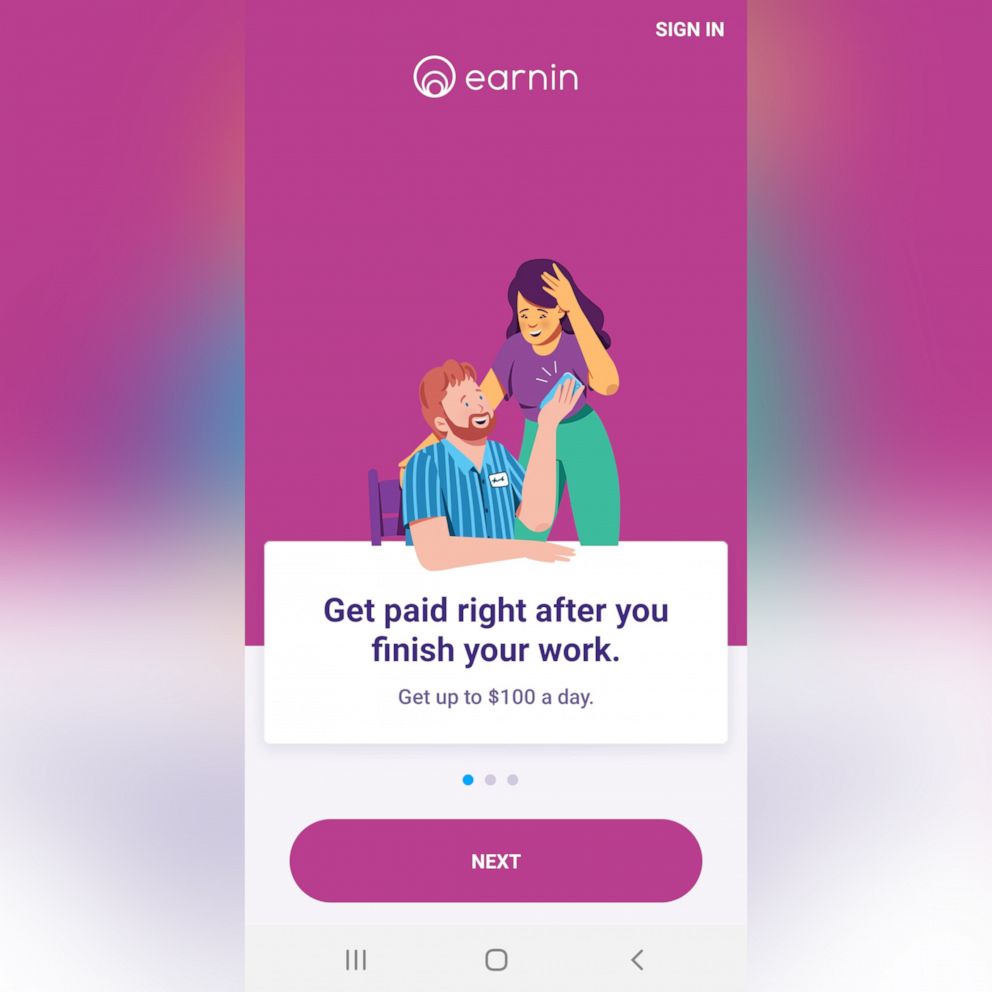
While some of these services say that they have steered clear of the predatory traps for which payday lending became notorious, some personal finance advisers and consumer groups are wary about them.
“Free early wage options are becoming more common,” the National Consumer Law Center (NCLC) wrote in a March 2020 report, but warned that they can “effectively result in repeated balloon-payment loans.”
“Early wage access might be helpful for occasional use, but programs should operate directly through employers, have strict limits on fees, and prevent a cycle of debt,” the report stated.
In March 2019, New York Department of Financial Services launched an investigation into the payroll advance industry and whether any companies were violating the state's lending laws.
Then in August, the agency opened a multi-jurisdictional probe, saying "some of these firms appear to collect usurious or otherwise unlawful interest rates in the guise of “tips,” monthly membership and/or exorbitant additional fees, and may force improper overdraft charges on vulnerable low-income consumers."
“The Department continues to closely scrutinize payroll advance loan companies in our active, on-going investigation, especially at time when consumers are most financially vulnerable due to the COVID-19 pandemic. DFS will take appropriate enforcement action regarding companies violating usury limits to protect New York consumers,” a DFS spokeswoman said in an emailed statement to ABC News.
Earnin insists its payday advance feature does not constitute payday loans, a spokesperson for the company told ABC News in an email.
"We're providing access to wages already earned with no mandatory fees and no interest. The product, Cash Out, is not a credit product; it’s non-recourse, which means there is no legal obligation to pay back. We do not impose a charge as a condition of access to the service," the spokesperson stated.
"Every day that you work and don’t get paid, you’re giving your employer a 0% interest loan," said Palaniappan. "With the technology we’ve built, we’re able to verify your earnings -- our product works like an ATM for your earnings. Unlike overdrafts and payday loans, Earnin offers advances on a non-recourse basis and without imposing a mandatory fee for the advance."
A spokesperson from Dave also denied the service was equivalent to payday loans.
"Dave is not a payday lender, quite the opposite," the spokesperson said. "The company was founded to end the need for payday loans or overdraft fees altogether. We provide small dollar advances (on average only $50) and members can access this service entirely for free. We don't believe that anyone should have to bear the cost of an expensive loan just to get gas and groceries, which is why Dave built it's advance service to be free (tips are optional). Because Dave does not charge interest, has no late fees, does not check or hurt credit nor send anything to collections, the regulations that properly govern the payday loan business are not applicable in Dave’s situation.”
Payday advance apps may offer insight into COVID-19 economic crisis
By analyzing app usage, Earnin and Dave say they can gain some economic insight.
Palaniappan said his company has noticed certain usage patterns which are likely reflective of the overall economy as the coronavirus pandemic rages on.
For instance, because users have to enter their work details to create a profile, Palaniappan said his company has analytics on how COVID-19 is affecting the job market.
"In California and New York we're seeing about 50% of the people are not going into work," he said. "It's really interesting if you look at the details on how that is happening, even before shelter in place came in, we saw that people were not going into work. The people who were paid salary were not going into work, the people who were paid hourly were going into work much more."
"To me that was interesting and a little sad ... the economic situation of some people put them at a higher risk for their health."
People are also looking for remote side work, according to the spokesperson from Dave.
"We've seen a 600% increase in users applying for remote jobs through our Side Hustle job-finding feature in the app. In the two weeks following the start of the crisis alone we saw 70,000 people apply for remote jobs via the Dave app, with thousands more applying each day," said the Dave spokesperson in an emailed statement to ABC News.
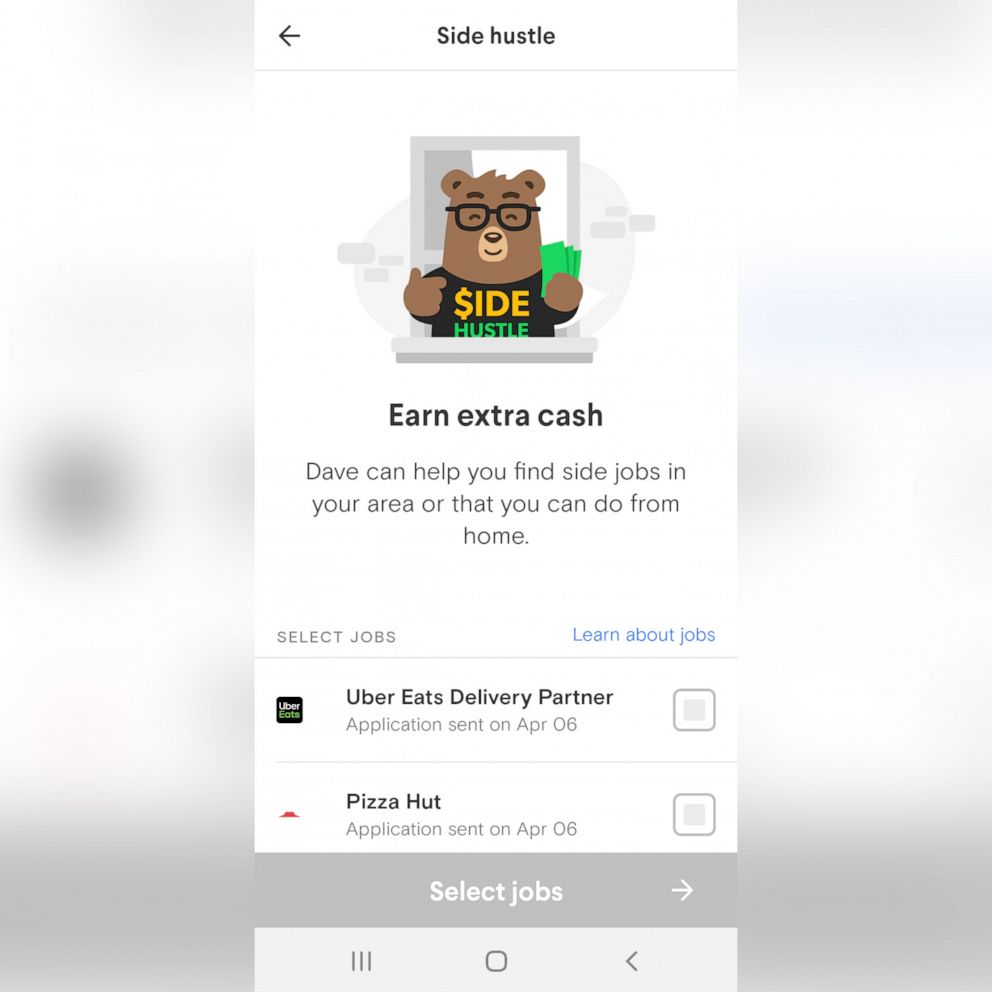
There is one problem with that in the current economic climate, though. In order to use these apps, you must have proof of steady income.
Which means the payday advance feature is unavailable to the more than 16 million who recently filed for unemployment as a result of the COVID-19 crisis.
Palaniappan said Earnin has plans to roll out services soon for those unemployed and for freelancers, both of whom the app currently does not accommodate.
Short-term relief or long-term budget damage?
In an app-centric economy, the financial services industry appears to have embraced the app model. Getting quick cash at a swipe or tap of a phone screen is alluring with its ease, particularly for those caught in a financial crunch.
"It’s very tempting in these tumultuous economic times to look for a quick fix for short-term financial needs, but you should avoid doing long-term damage to your finances at all costs," said Stacey Tisdale, president and CEO of Mind Money Media Inc.
Tisdale said you should explore alternatives before opting to use cash advance apps. One way to get more financially settled, begins with the COVID-19 stimulus checks, she said.
“Make the most impactful decisions as possible with your stimulus check, especially putting away some of it for savings,” she advised.
“Cut all unnecessary expenses, file for unemployment benefits and reevaluate your spending.”
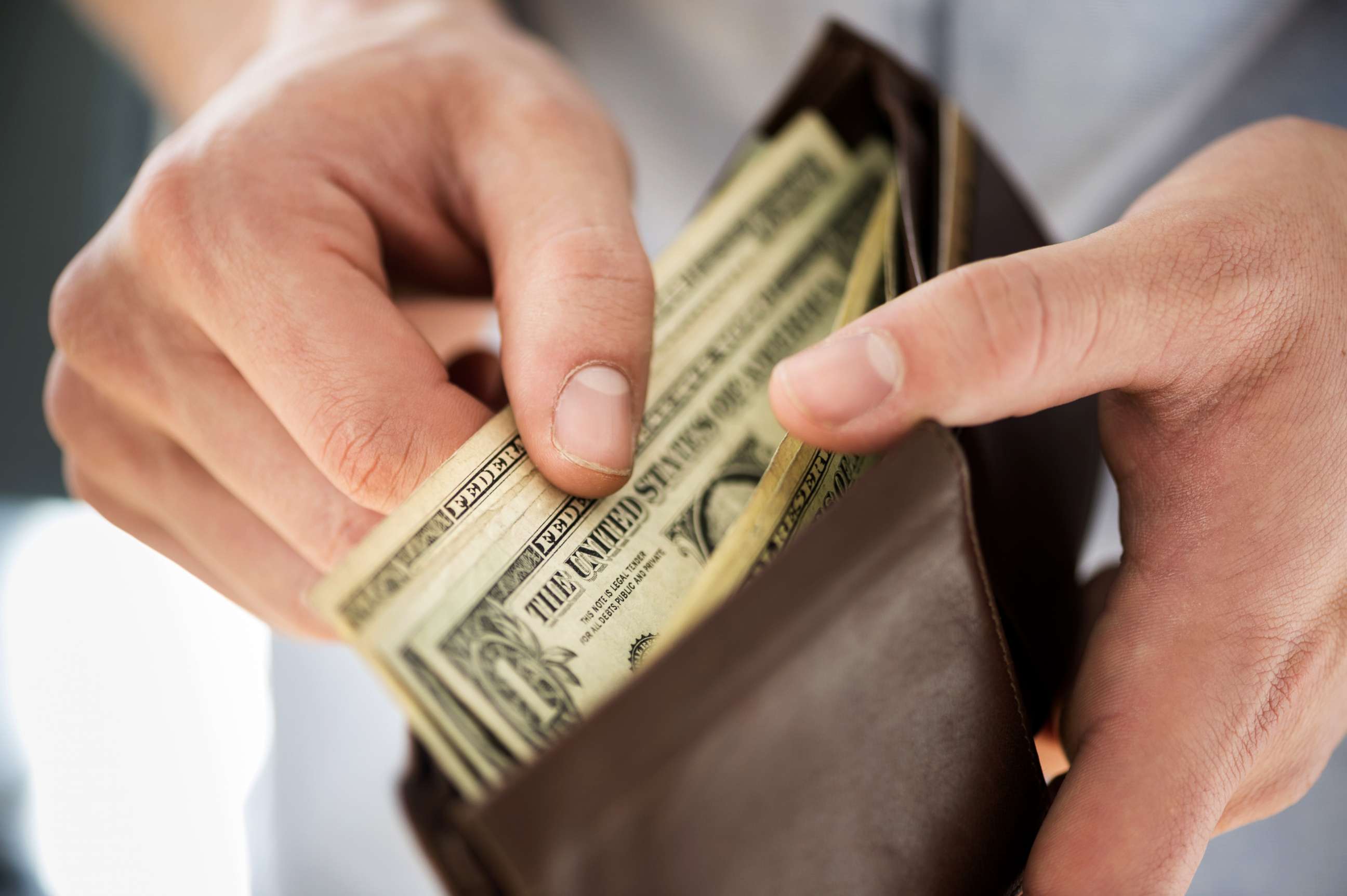
The NCLC said employers need to do more in its report. Employers should pay a living wage and offer regular work schedules, better options such as tools for savings, and affordable small dollar installment loans.
The takeaway seems to be payday advance apps can be useful but constant dependence on them can be problematic.
"People should be very wary of services that claim to offer free ways to access money early. Pay advances are often just a fintech payday loan that leave a hole in your next check and put you in a cycle of debt. Apps may find ways to make it difficult not to pay tips that are purportedly voluntary, and "tips" can add up just like traditional payday loan fees do,” said the NCLC's associate director Lauren Saunders.
Still, users of these apps like Jones sees them as better solutions in an economically fragile time than “your typical payday loan service that rips you off when you may need a little financial support until your next paycheck."
What to know about coronavirus:
- How it started and how to protect yourself: Coronavirus explained
- What to do if you have symptoms: Coronavirus symptoms
- Tracking the spread in the U.S. and worldwide: Coronavirus map
